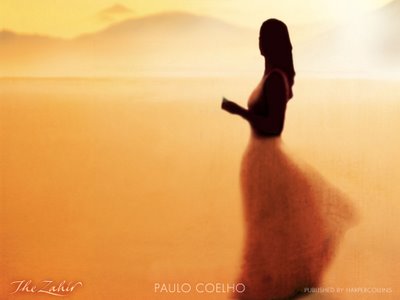PERSONAL: THE ZAHIR, A REFLECTION
"...the true experience of freedom is having the most important thing in the world without owning it..." -- Paulo Coelho (Eleven Minutes)
If it would not have been for The Alchemist, I probably won't be interested in reading another Coelho. The Zahir is a story of a bestselling novelist who becomes obsessed with finding out what made his wife, Esther, leave him despite his undying love for her, his wealth and stability. For two years or so, his search for her and the truth of his own life made him lose himself in the process. So what's this Zahir I'm talking about?
The Zahir as described by Paulo Coelho in an interview: According to the writer Jorge Luis Borges, the idea of the Zahir comes from the Islamic tradition and probably arose in the eighteenth century. In Arabic “zahir” means “visible”, “present”, “incapable of going unnoticed”. It can refer to an object or a person, and that object or person gradually takes over our every thought, until we are unable to think of anything else. This could be considered a state of holiness or a state of madness.
Esther, even though she has everything a woman could ever wish for, left in search of happiness. A war correspondent and a successful journalist, she risked covering an ongoing war in a very remote country. The author mentioned in his book that people in a war zone experience true happiness when they're faced with a real battle. "Why?” The same thing I asked myself. It is because they don't live the future but in the present. They don't have to think about what to eat tomorrow or where to spend the holidays or whether they would still have the chance to do that because today might be their last. In short, they savor every second of their life, do all the things that they think would best make each day complete. When I came across this page of the novel, I stopped for quite a long while and tried to imagine myself in these people's shoes. It must be really hard for them to face bullets while thinking about their family from far away. I came to realize that my perspective in life is no closer to theirs. Each night before I sleep, I can't help but worry what will happen tomorrow... and the tomorrow of tomorrow, and torture myself about the events of the past. Yes, I fear the future and worry about many things. I noticed that more often than not, though I know I'm in no control of the unknown, most of my time is wasted on nothing. Not until I got hold of this book.
Now, I’ve learned to appreciate more what life has given me, to cherish and love the people who love me and forgive those who don't. I will rebuild my faith and entrust my future to Him.
My favorite passage from the novel is: "Until one morning, I'll wake up and find I'm thinking about something else, and then I'll know the worst is over. My heart might be bruised but it will recover and become capable of seeing the beauty of life once more. It happened before, it will happen again, I'm sure, when someone leaves, it's because someone is about to arrive. I'll find love again." Do you think when no one arrives, someone has never really left? Maybe. But have you thought that someone has really left for a reason and that the one who would come might just be waiting for the right time?
Coelho describes a relationship similar to a pair of railway tracks which always are parallel with each other while keeping their distance, maintaining a certain space in between thus allowing the chance to grow on each own. It's another way of putting Kahlil Gibran's words on marriage: “Let each one of you be alone, even as the strings of a lute are alone though they quiver with the same music... and stand together yet not too near together: for the pillars of the temple stand apart, and the oak tree and the cypress grow not in each other's shadow”. The protagonist of the novel read the signs, waited for the right moment, and has recovered.
Let me conclude by quoting another passage: "Love is a disease; no one wants to get rid of it. Those who catch it never try to get better, and those who suffer it do not wish to be cured." We may not admit it, but each one of us has his/her own Zahir. For some it may be something, but for many it's someone, or better put, it is love for someone. Yes, for almost seven years now, I do have one, but I'm slowly making a distance from it. I'm breaking away from the world I built just for my Zahir and myself alone and began to look beyond the here and now. It may take a while. It won't be easy, I know, but I have to. Happiness I will search, I'm trying.
I'm letting go of my Zahir.
______________
Mary Grace Reytiran is from CIS. She has been part of our A Series of Fortunate Events since Day One and a member of our Project R.E.A.D. - Readers Circle.

No comments:
Post a Comment